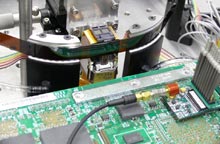A boost in storage density could keep magnetic tapes spinning for years, thanks to new research from IBM and Fujifilm. Increasing the density of data that can be stored on a tape makes it more difficult to reliably read information, which is already a problem because of electromagnetic interference and because the heads themselves will retain a certain amount of residual magnetism from readings. To overcome this, the IBM group developed new signal processing algorithms that simultaneously process data and predict the effect that electromagnetic noise will have on subsequent readings.Photo: The read-write machine used to demonstrate a new magnetic tape technology developed by IBM and Fujifilm. Credit: IBM Research ZurichRead more about the research from Technology Review.
New Life for Magnetic Tape






